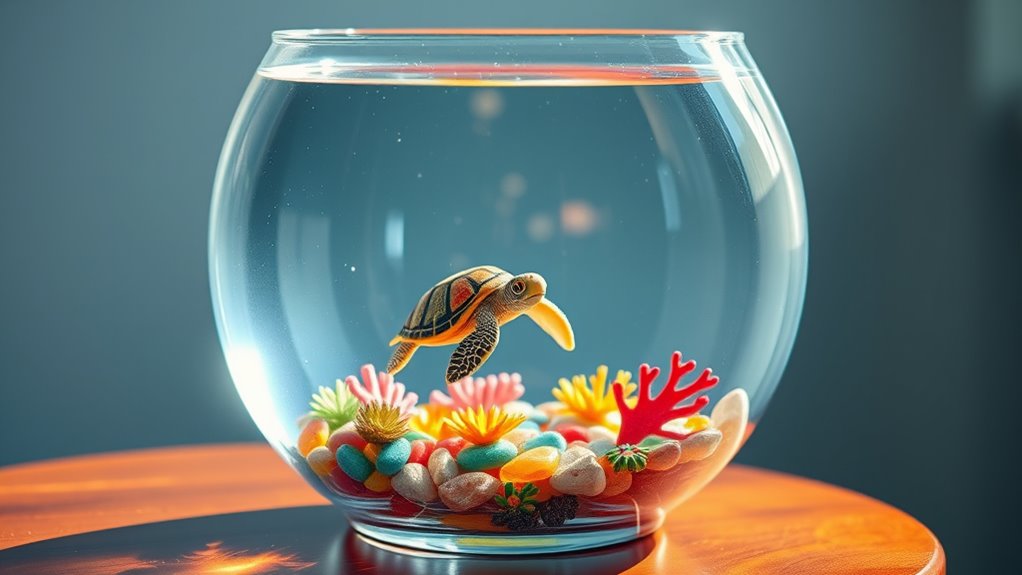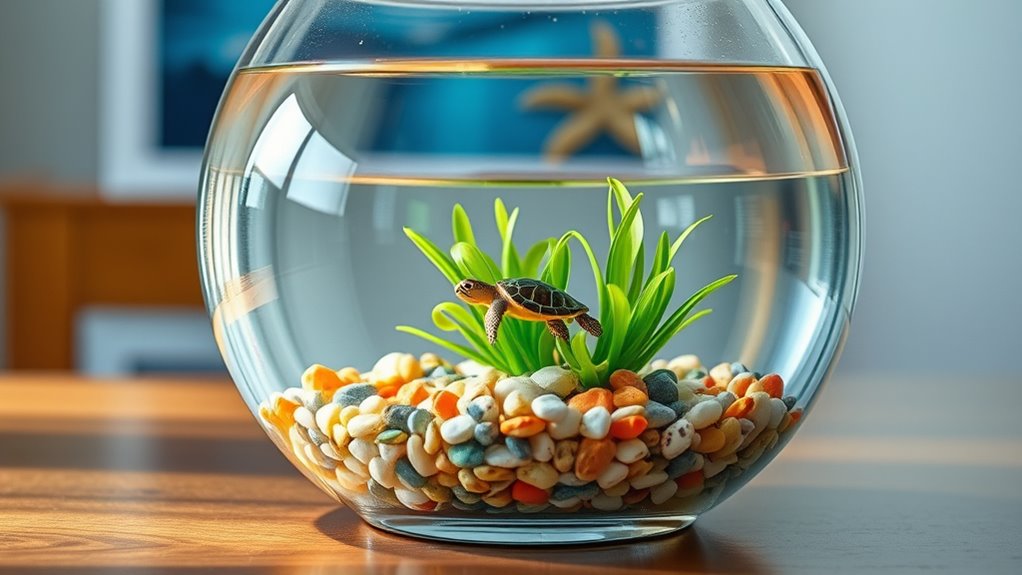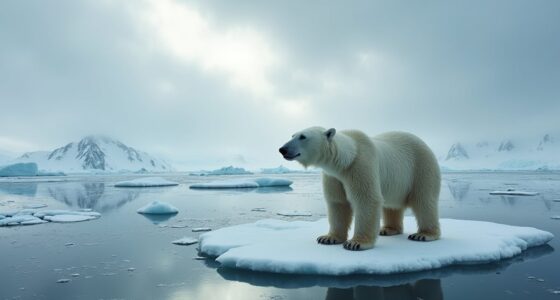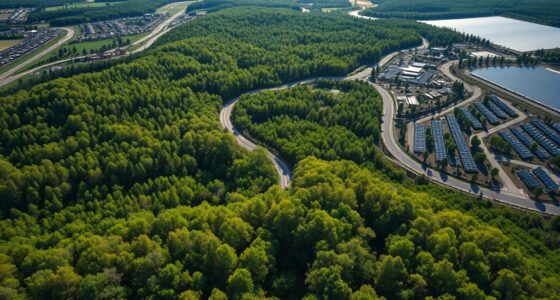Your small goldfish bowl may seem harmless, but poor maintenance and disposal can pollute local waterways, harming marine life like sea turtles. Chemicals, waste, and excess nutrients from home aquariums can end up in oceans, disrupting ecosystems and threatening turtles’ survival. By adopting responsible practices—using eco-friendly products and proper disposal—you help protect these crucial habitats. Keep going to discover simple ways to turn your aquarium habits into a force for ocean conservation.
Key Takeaways
- Small aquariums can release pollutants that harm ocean ecosystems and vulnerable sea turtles.
- Chemicals and waste from home tanks often enter waterways, disrupting marine and freshwater habitats.
- Responsible maintenance reduces chemical runoff and minimizes environmental pollution from aquariums.
- Proper disposal and eco-friendly products help prevent harmful substances from reaching the ocean.
- Individual actions in aquarium care contribute to global efforts to protect sea turtles and marine biodiversity.

Many people don’t realize that the small choices they make at home can have a big impact on sea turtle conservation. When you think about your goldfish bowl or small aquarium, it’s easy to overlook how your actions can influence the health of our oceans and the creatures that inhabit them. One often overlooked issue is aquarium pollution. Even tiny fish tanks contribute to environmental problems if not maintained properly, releasing chemicals, excess nutrients, and waste into waterways. These pollutants can eventually reach the ocean, disrupting delicate ecosystems and threatening sea turtles, which are already vulnerable to pollution-related threats.
Small home aquariums can impact ocean health and sea turtles through pollution if not properly maintained.
Furthermore, the freshwater impact of your aquarium extends beyond just the water inside your home. When cleaning or replacing your tank water, if waste and chemicals aren’t disposed of responsibly, they can find their way into local water systems. These pollutants then travel downstream, impacting freshwater habitats that serve as breeding grounds for many marine species, including sea turtles. The health of freshwater ecosystems is interconnected with the health of marine environments. Pollution from aquariums can cause algal blooms, deplete oxygen levels, and introduce toxic substances into rivers and lakes, making it harder for sea turtles to find clean, safe habitats for feeding and nesting.
You might not think your small aquarium has much influence, but collectively, millions of home tanks contribute to a significant environmental footprint. The chemicals used in water conditioners, medications, and cleaning products can all add up, polluting water sources if disposed of improperly. Additionally, the production and transportation of aquarium supplies involve carbon emissions, which contribute to climate change—a major threat to sea turtles worldwide. Choosing eco-friendly products, minimizing chemical use, and responsibly disposing of waste are simple steps you can take to reduce your aquarium’s freshwater impact.
Being mindful of the materials and methods you use to maintain your aquarium not only benefits your fish but also supports broader conservation efforts. Opt for biodegradable or eco-friendly cleaning products, and never pour leftover chemicals or excess water down the drain without checking local disposal regulations. By doing so, you help reduce pollution that could eventually reach oceans and harm sea turtles. Small actions at home ripple outward, and your commitment to responsible aquarium management can make a real difference. Saving sea turtles starts with understanding how your everyday choices—no matter how small—can contribute to healthier freshwater and marine environments. Additionally, supporting aquarium pollution awareness initiatives can help promote sustainable practices on a larger scale.
Frequently Asked Questions
How Does a Goldfish Bowl Impact Sea Turtle Conservation?
Your goldfish bowl impacts sea turtle conservation by highlighting the importance of aquarium sustainability and habitat preservation. When you choose eco-friendly aquariums and avoid plastic waste, you help reduce pollution that harms marine life. Small actions like responsibly managing your aquarium can raise awareness and promote better practices. By caring for your goldfish responsibly, you contribute to the larger effort of protecting sea turtles and their habitats worldwide.
Can Small Freshwater Tanks Affect Marine Ecosystems?
Small freshwater tanks can impact marine ecosystems by contributing to invasive species and water pollution. If you release fish or plants from these tanks into natural waters, you risk introducing invasive species that threaten native wildlife. Additionally, improper disposal or overfeeding leads to water pollution, which harms marine life. By being responsible, you can prevent these issues and help protect delicate ecosystems from these small but harmful impacts.
What Are the Differences Between Freshwater and Saltwater Habitats?
Imagine contrasting vibrant freshwater biodiversity with vast saltwater habitats. Freshwater habitats, like lakes and streams, support diverse plants and animals adapted to low salinity, while saltwater environments, such as oceans, host larger, more specialized marine life. Habitat disparities influence species distribution, behavior, and survival. You see, understanding these differences helps you appreciate the unique ecosystems and highlights the importance of protecting both freshwater and saltwater habitats for overall ecological health.
How Can I Educate Others About Sea Turtle Protection?
You can educate others about sea turtle protection by sharing facts about coral reef preservation and marine pollution reduction. Encourage them to reduce plastic use, support conservation efforts, and participate in local beach cleanups. Use social media, community talks, or school programs to spread awareness. Highlight how healthy coral reefs and cleaner waters directly benefit sea turtles, inspiring others to take action and become part of the solution.
Are There Simple Steps to Reduce My Aquarium’s Environmental Footprint?
To reduce your aquarium’s environmental footprint, focus on simple steps like proper aquarium maintenance and maintaining excellent water quality. Regularly clean your tank, avoid overfeeding, and use eco-friendly products. Choose energy-efficient equipment and monitor water parameters to prevent waste. By doing so, you minimize harmful runoff and energy use, helping protect aquatic ecosystems. Your mindful habits make a difference in preserving the environment and supporting healthy sea life.
Conclusion
Every small step you take can profoundly save sea turtles. By switching from a goldfish bowl to a spacious tank, you reduce harm and help protect their homes. Remember, your responsibility ripples beyond your room—rescuing reefs, restoring habitats, and respecting nature. So, start simple, stay sincere, and make mindful choices. Your mindful moments matter more than you realize, making a mighty difference in maintaining marine life’s magic and ensuring a safer sea for all.








